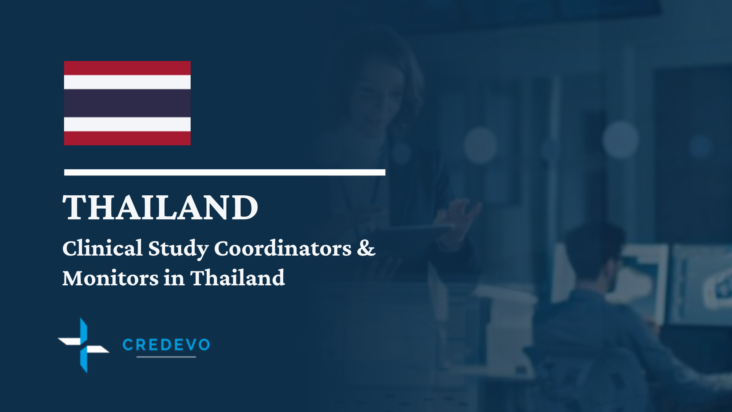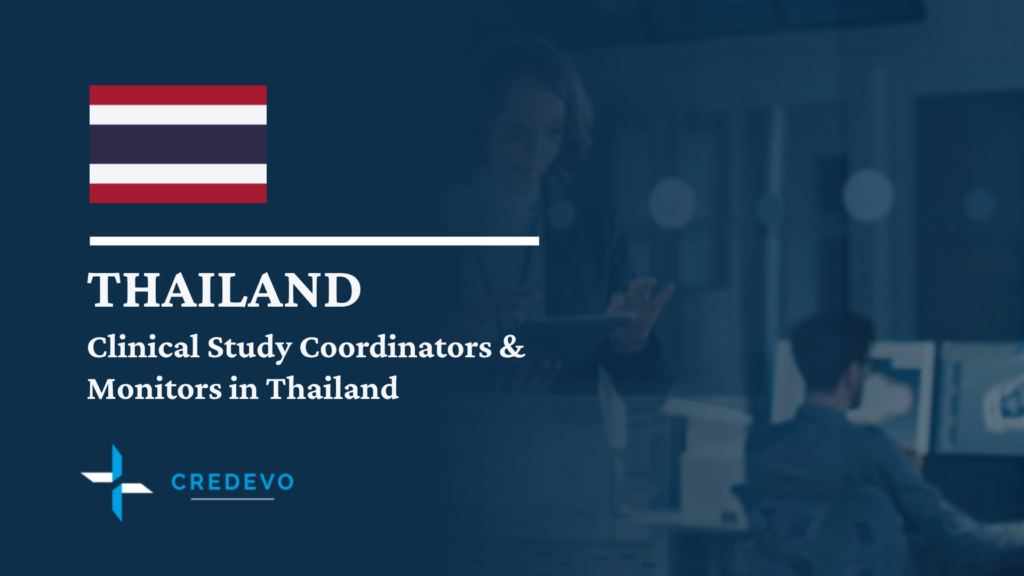Clinical Study Coordinators & Monitors in Thailand: Qualifications, Responsibilities, and Regulatory Compliance

In the realm of clinical research in Thailand, clinical study coordinators and monitors play a vital role in ensuring the smooth execution of trials while adhering to regulatory compliance.

In the dynamic landscape of clinical research in Thailand, the pivotal roles of clinical study coordinators and monitors cannot be overstated. These dedicated professionals are at the forefront of ensuring the successful implementation of clinical trials while upholding rigorous regulatory compliance. From their essential qualifications and responsibilities to their unwavering commitment to ethical practices, understanding the intricacies of their roles is vital for the advancement of safe and effective healthcare interventions in Thailand.
This article delves into the qualifications, responsibilities, and ever-evolving landscape of regulatory compliance that clinical study coordinators and monitors encounter in Thailand’s clinical research arena.
To begin, let’s first gain a clear understanding of the regulatory landscape in Thailand for conducting clinical trials.
Regulatory Compliance: Navigating the Thai clinical research landscape
Navigating the Thai clinical research landscape requires a strong understanding of the regulatory framework governing clinical trials in the country. Compliance with regulatory requirements is crucial to ensure the ethical conduct of research studies and the protection of study participants. Here are a few points highlighting the importance of regulatory compliance in clinical research in Thailand:
- Regulatory authority: The FDA oversees clinical trials in Thailand.
- Ethics committee review: Ethical approval is required before initiating research studies.
- Good Clinical Practice (GCP): Adherence to GCP guidelines ensures ethical and high-quality research.
- Informed consent: Complying with Thai regulations on informed consent is essential.
- Investigational product approval: Approval from the FDA is necessary for using investigational products.
- Reporting and safety monitoring: Prompt reporting of adverse events to the FDA is mandatory.
- Record keeping: Accurate documentation of study-related information is crucial.
- Site inspections and audits: Inspections may be conducted to assess regulatory compliance.
- Training and education: Continuous education on regulatory compliance is necessary.
- Collaboration with regulatory authorities: Maintaining communication with regulatory authorities promotes compliance and smooth study operations.
Qualifications and Responsibilities of Clinical Study Coordinators in Thailand
Clinical study coordinators play a crucial role in the successful execution of clinical trials. They are responsible for ensuring that the studies are conducted in compliance with ethical standards, regulatory guidelines, and good clinical practices.
They assist in the coordination and management of various aspects of clinical studies, contributing to the advancement of medical knowledge and the improvement of healthcare practices. Let’s delve into the qualifications and responsibilities of clinical study coordinators in Thailand.
Qualifications:
- Educational Background: Clinical study coordinators typically hold a bachelor’s or master’s degree in a relevant field, such as life sciences, pharmacy, nursing, or medicine. A strong academic foundation provides them with the necessary knowledge and understanding of medical research principles.
- Knowledge of Regulatory Requirements: Clinical study coordinators should be well-versed in the regulatory framework governing clinical trials in Thailand, including the guidelines set forth by the Food and Drug Administration (FDA) and the ethical principles outlined in the International Conference on Harmonisation (ICH) guidelines.
- Good Clinical Practice (GCP) Training: Clinical study coordinators need to have undergone GCP training. GCP ensures that the studies are conducted ethically and with integrity, protecting the rights, safety, and well-being of study participants.
- Language Proficiency: Proficiency in Thai and English is crucial for clinical study coordinators, as they need to communicate effectively with participants, investigators, sponsors, and other stakeholders involved in the clinical study.
Responsibilities:
- Protocol Development and Implementation: Clinical study coordinators contribute to the development and implementation of study protocols. They collaborate with investigators and sponsors to ensure the protocols are well-designed, scientifically sound, and feasible within the local context.
- Participant Recruitment and Informed Consent: Coordinators are responsible for identifying potential study participants and obtaining their informed consent. They explain the study objectives, procedures, risks, and benefits to participants, addressing any concerns or questions. Coordinators must ensure that participant recruitment is conducted ethically and complying with regulatory requirements.
- Data Collection and Management: Coordinators oversee the collection, documentation, and management of study data. They ensure that data is accurately recorded and maintained by standard operating procedures (SOPs) and data protection regulations. Coordinators may use electronic data capture systems to facilitate data management.
- Study Monitoring and Compliance: Clinical study coordinators assist in study monitoring visits conducted by sponsors, regulatory authorities, or ethics committees. They ensure that the study site is compliant with the protocol, GCP, and regulatory requirements. Coordinators may also participate in audits and inspections, addressing any findings or non-compliance issues.
- Safety Reporting: Coordinators play a crucial role in adverse event reporting and safety monitoring. They promptly report any adverse events or serious adverse events to the appropriate parties and facilitate the implementation of safety measures to protect study participants.
- Documentation and Regulatory Submissions: Coordinators maintain comprehensive and accurate study documentation, including study files, case report forms, and regulatory submissions. They assist investigators in preparing and submitting relevant documents to regulatory authorities and ethics committees.
- Collaboration and Communication: Clinical study coordinators collaborate closely with investigators, study sponsors, regulatory authorities, and other study team members. Effective communication and coordination ensure smooth study operations, adherence to timelines, and successful study completion.
Qualifications, knowledge, and responsibilities contribute to the generation of reliable and valuable data, advancing medical research and ultimately improving patient care and treatment outcomes.
Are you seeking the most qualified clinical study coordinators and monitors in Thailand? Please provide your necessary details below to connect with us.
The vital role of clinical study monitors in ensuring data integrity
The role of clinical study monitors is vital in ensuring data integrity throughout the process of conducting clinical trials. These professionals play a critical role in safeguarding the accuracy, reliability, and validity of the data generated during the study. Here are a few key points highlighting the vital role of clinical research monitors in ensuring data integrity:
- Quality assurance: Clinical study monitors to ensure compliance with study protocols, SOPs, and regulatory guidelines.
- Source data verification: Monitors review and verify the accuracy of source data against CRFs.
- Adherence to the protocol: Monitors confirm that study procedures are performed as per the protocol.
- Data management and documentation: Monitors oversee accurate and complete data recording and maintenance of essential documents.
- Identification and resolution of data discrepancies: Monitors identify and resolve inconsistencies or missing information in the data.
- Risk assessment and mitigation: Monitors assess and address potential risks to data integrity.
- Regulatory compliance: Monitors ensure adherence to regulatory requirements and assist in inspections.
- Training and education: Monitors provide training on GCP and data collection methods.
- Collaboration and communication: Monitors work closely with study teams to address data integrity issues.
Effective communication and collaboration: Key skills for coordinators and monitors
Effective communication and collaboration are vital skills for clinical study coordinators and monitors. These professionals interact with various stakeholders involved in clinical trials and play a crucial role in ensuring the smooth execution of research studies. Here are a few points highlighting the importance of effective communication and collaboration skills:
- Stakeholder engagement: Engage with various stakeholders involved in clinical trials.
- Clear communication: Convey study-related information to stakeholders.
- Active listening: Listen attentively to understand needs and concerns.
- Conflict resolution: Resolve conflicts professionally and constructively.
- Team coordination: Coordinate activities and share information within multidisciplinary teams.
- Timely and proactive communication: Provide timely updates and address concerns promptly.
- Cultural sensitivity: Demonstrate respect for diverse cultural backgrounds.
- Documentation and reporting: Accurately document and report study-related information.
- Information sharing and training: Disseminate knowledge and guidelines to study personnel.
- Collaborative problem-solving: Engage stakeholders in finding solutions to challenges.
Training and professional development for clinical study coordinators and monitors
Training and professional development are crucial for clinical study coordinators and monitors to enhance their skills, knowledge, and competencies in conducting successful clinical trials. Here are a few points highlighting the importance of training and professional development for these roles:
- GCP training: Essential for ethical and regulatory compliance.
- Study-specific training: Familiarization with study protocols and requirements.
- Regulatory and ethical training: Understanding local regulations and ethical guidelines.
- Data management training: Ensuring accurate and reliable data collection.
- Adverse event reporting and safety training: Identifying and reporting adverse events.
- Communication and interpersonal skills training: Enhancing interaction with stakeholders.
- Problem-solving and decision-making training: Addressing challenges and making informed decisions.
- Quality assurance and audit training: Ensuring compliance and preparing for audits.
- Professional development opportunities: Continuous learning and industry updates.
- Mentorship and peer learning: Gaining insights from experienced professionals.
Challenges in finding clinical study coordinators and Monitors in Thailand
- Limited pool of qualified candidates: Thailand may have a smaller pool of experienced clinical study coordinators and monitors compared to more developed countries. The number of professionals with specific expertise in clinical research may be limited, which can make recruitment more challenging.
- Language barriers: Although English is widely spoken in Thailand, there may still be language barriers, particularly when it comes to technical terminology and documentation related to clinical trials. Fluency in English is crucial for clinical study coordinators and monitors to effectively communicate with international sponsors, investigators, and regulatory bodies.
- Competition from other industries: The pharmaceutical and clinical research industry in Thailand might face competition from other sectors, such as healthcare and tourism. This can make it difficult to attract and retain talented professionals in the clinical research field.
- Regulatory knowledge and compliance: Clinical studies are governed by strict regulatory guidelines and requirements. It may be challenging to find individuals who have a thorough understanding of Thai regulations as well as international standards, such as Good Clinical Practice (GCP). It is crucial to ensure that coordinators and monitors are well-versed in local and global regulatory frameworks.
- Limited infrastructure and resources: In some regions of Thailand, particularly in rural areas, the infrastructure and resources necessary for conducting clinical studies may be limited. This can pose challenges in terms of site selection, monitoring activities, and data management.
- High turnover rates: The turnover rate among clinical study coordinators and monitors can be relatively high in certain settings. This can be attributed to various factors, including the demanding nature of the job, career advancement opportunities, and competitive salaries. Maintaining a stable and experienced team can be a recurring challenge.
Do you need our support for finding Clinical Study Coordinators & Monitors in Thailand?
Credevo can help you find quality clinical study coordinators and monitors for your clinical trials. Provide your details in the form below to connect with us and access efficient resources for your clinical trials.